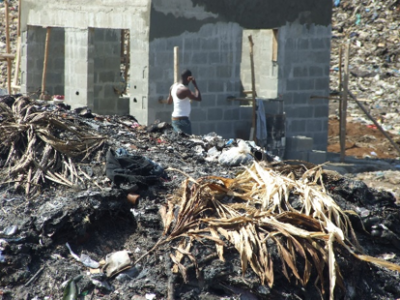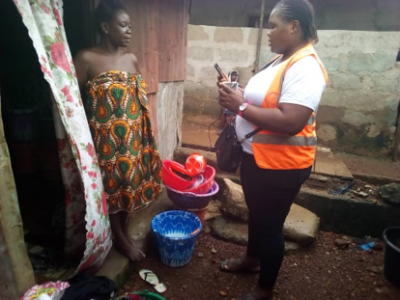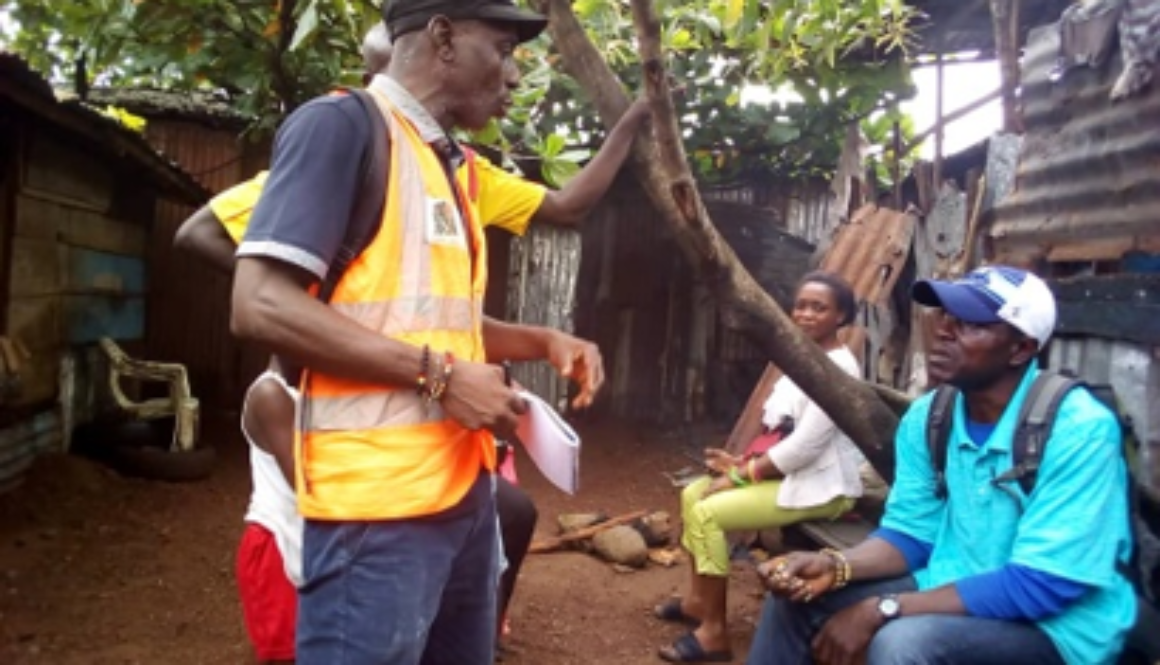Upgrade where possible and relocate where necessary
By Francis Anthony Reffell and Yirah Oryanks Conteh
FEDURP/CODOHSAPA’s slogan is, “upgrade where possible and relocate where necessary”. This is what guided us when Mayor Yvonne Aki-Sawyerr asked us to advise on CrabTong/Kolleh Tong/Grey Bush (CKG) and Kingtom, two neighbourhoods seated on the Bomeh dumpsite.
Living among hazards
Freetown, the capital of Sierra Leone, was planned by the colonial government to accommodate 300,000 residents. Currently, its population is 1,055,964 – three times the original population the city was planned for over 50 years after independence. This situation has been caused by rural-urban drift necessitated by the search for greener pastures. This was further exacerbated by the 10-year civil war that saw a significant movement of the rural population to Freetown seeking security and survival.
 Most of this population have found themselves occupying ‘hazard’ spots and they cannot afford to rent better housing facilities. Compounding their challenging situation, is their exclusion from social services and employment opportunities, as the available utilities are already overstretched. The FEDURP/CODOHSAPA settlement profile report of 2015 found that approximately 35% of the entire Freetown population lives in hazardous informal settlements.
Most of this population have found themselves occupying ‘hazard’ spots and they cannot afford to rent better housing facilities. Compounding their challenging situation, is their exclusion from social services and employment opportunities, as the available utilities are already overstretched. The FEDURP/CODOHSAPA settlement profile report of 2015 found that approximately 35% of the entire Freetown population lives in hazardous informal settlements.
Supporting local government
Mayor Yvonne Aki-Sawyerr’s request came about at a meeting she convened to discuss ways to mitigate flooding in the middle of the rainy season. It was already becoming clear that the most affected places were neighbourhoods on dumpsites – CrabTong/Kolleh Tong/Gray Bush and Kingtom fell within this category. Her hope was to relocate these settlements to avert a looming catastrophe and to make way for a waste management pipeline.
In response to the Mayor’s request, FEDURP/CODOHSAPA leadership engaged with her office to understand the model of relocation. They agreed to assist if internationally accepted best practice on relocation was respected. The Mayor affirmed her commitment to respecting these protocols.
A plan was initiated, which included joint community consultations to seek community consensus, community mapping and enumeration by FEDURP/CODOHSAPA, provision of a comprehensive financial package for affected occupants and demolition of structures. FEDURP/CODOHSAPA also committed to broker a consensus with the community since they are a trusted partner.
Community engagement
 Going forward, a FEDURP/CODOHSAPA data team was constituted and engaged. Existing mapping and enumeration tools were customised to reflect this specific action. Following that, an initial joint community meeting with Freetown City Council (FCC) authorities was convened where the intended plan to relocate residents was disclosed. We explained that the mapping and enumeration exercise would take place to inform the relocation process.
Going forward, a FEDURP/CODOHSAPA data team was constituted and engaged. Existing mapping and enumeration tools were customised to reflect this specific action. Following that, an initial joint community meeting with Freetown City Council (FCC) authorities was convened where the intended plan to relocate residents was disclosed. We explained that the mapping and enumeration exercise would take place to inform the relocation process.
While undertaking the mapping and enumeration exercise, one respondent said this:
We are only cooperating because of FEDURP/CODOHSAPA, so please make sure FCC honours its commitments otherwise you will be held responsible and we will conclude that you have compromised our values and solidarity.
For FEDURP/CODOHSAPA, this was a strong message, as this was the first collaboration with FCC to effect relocation procedures and it put our relevance in the communities to the test.
Community entitlements
Based on the data we collected, learning gleaned from an exchange with colleagues in South Africa and consultation with the FCC the following actions were recommended:
- Shack owners have their structures evaluated and paid for in full
- A year’s rent will be offered to tenants which they can use to relocate and rent in a safer settlement of their choice
- Tenants will be offered a minimum grant to kick start their livelihood in their new settlements
We have continued to engage with the FCC and the residents and all entitlements and dues have been honoured by the council. All residents voluntarily evacuated in or before the second week of November to give way to the demolition of structures.
What did we learn?
Connecting the pieces of this process together, key lessons learned include the following:
- The outcome of this process is a proof that ‘information is power!” FEDURP/CODOHSAPA’s data collection practices provided the leverage for a progressive partnership with, and trust between, the community and FCC, which has now been translated into “knowledge for action.”
- Involving communities in all phases of any development process stimulates sense of ownership. There are no indications of any resistance from the residents. In this case, the role of FEDURP/CODOHSAPA has been very critical in brokering a consensus, which shows how relevant it is as a social movement in fostering community solidarity.
- International exchange learning for slum dwellers and informal settlers is an important tool for capacity and knowledge building. The South African experience shared with and accepted by FCC has proven to be effective.
There is much that ARISE can take away from this experience to inform capacity building tools for co-researchers and other key community stakeholders and participants.
Francis is Founder and Director of the Centre of Dialogue on Human Settlement and Poverty Alleviation (CODOHSAPA) and Yirah is the National Federation Leader of the Federation of Urban and Rural Poor – Sierra Leone (FEDURP).
